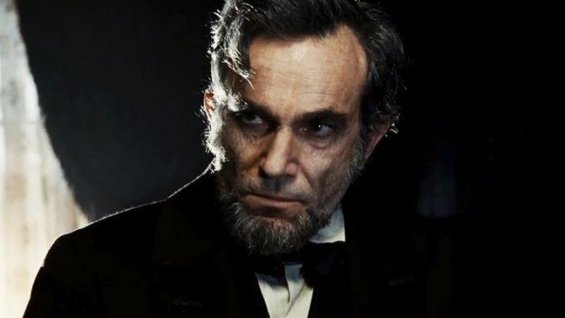Lincoln

Daniel Day-Lewis as Abraham Lincoln in Steven Spielberg's biopic.
On the question of liberty, as a principle, we are not what we have been. When we were the political slaves of King George, and wanted to be free, we called the maxim that “all men are created equal” a self evident truth; but now when we have grown fat, and have lost all dread of being slaves ourselves, we have become so greedy to be masters that we call the same maxim “a self evident lie.”
-Abraham Lincoln, Letter to George Robertson, 15 August 1855
Set against the backdrop of the “intimate and ugly” Civil War, the bloodiest on American soil, the film opens with Abraham Lincoln (Daniel Day-Lewis) visiting with black soldiers at an encampment. If only because this mechanism of self-aware history is so often used, it’s one of only two gratuitous moments in the film. Mr. Spielberg has a penchant for heartstring-tugging scenes. His desire to do something honorable, admirable, is evident. But it often undermines the tone of his films (consider the girl in red in Schindler’s List). These moments, including the obligatory filing in of the unprivileged during the House hearings on passage of the Thirteenth Amendment, are unnecessary, even if historically accurate. One single shot with Thaddeus Stevens (Tommy Lee Jones) settling into bed with his housekeeper and partner of twenty three years, Lydia Hamilton Smith (S. Epatha Merkerson), accomplishes the sentiment. Doubly so for me, as I often forget that I’m in an interracial marriage. Perhaps Mr. Spielberg doubted his ability to capture more deeply the other the side of the story, rather focusing on the contentious politicking and corrupt dealings with shady men—James Spader as W.N. Bilbo—all of which thrust abolition onto the House floor. Fair enough. But not one scene with Frederick Douglass or any other black abolitionists of import?
As Lincoln is almost entirely dialogue-driven, it would be a Herculean task to wade through entire scenes and discussions. The broad strokes are that it is a masterfully-acted, painstakingly filmed and insightfully-written lesson in politics, political discourse and the art of negotiation. As Lincoln, Mr. Day-Lewis resurrects his fondness for stories, for deep reflection (as exemplified in many letters of correspondence), a high-pitched, squeaky voice and his gangly, lurching gait—possibly symptoms of Marfan Syndrome.
As William H. Seward, Secretary of State, David Strathairn’s stalwart demeanor counterbalances Daniel Day-Lewis’ impassioned President. If Seward is the clockwork lieutenant, then Tommy Lee Jones’ Thaddeus Stevens is the contradiction: A weary-eyed, old crank of a Representative who happens to be the prototypical radical liberal. Mr. Jones’ so-old-I’m-tired-of-everything-but-have-a-soft-side is overplayed, but a bit of comedic relief in a very heavy film. Sally Field seems an odd choice for Mary Todd, playing a woman rebuffed by the public and possibly bipolar, but her acting chops shine in an intense argument with Abraham. Ms. Field summons a mother’s fierce determination in the wake of personal and national tragedy.
Janusz Kaminski’s cinematography combined with Rick Carter’s production design has the effect of oil portraiture. One scene in the bowels of the White House war room, Lincoln relates a joke to senior staff about George Washington (too funny to spoil) while huddled in a blanket—ages before central heating, the paint-and-canvas feel is accentuated by flickering lamps. This is scene composition of the calibre of Amadeus‘ Mirsolav Ondricek. Postwar Europe, to its credit, produced scores of documentarians who later became neorealist filmmakers. Mr. Kaminski, no stranger to political strife, captures in chiaroscuro a House deeply divided and running out of time.
Time is the recurring motif in Steven Spielberg’s twenty-seventh theatrical feature film, Lincoln. Clocks tick away faintly in the backdrop of the film’s many closed-room dialogues with his advisors. As President Lincoln posits, “Can we choose to be born? Are we fitted to the times we’re born into? We begin with equality, that’s the origin isn’t it? That’s justice.”
As a first generation Indian immigrant, I find these words portentous, immortal, as must have the openly gay screenwriter Tony Kushner, who peppers these backroom dealings with historically accurate dialogue. Mr. Kushner would have been just entering his teenage years during the Stonewall Riots. I am generations removed from British rule of my birthplace. Who would either of us be? What would we have made of the opportunity? Here Mr. Kushner, through the vessel of Daniel Day-Lewis, marveously encapsulates the cerebral, doubting Lincoln. A man who sees the responsibility of the Presidency as something larger than himself. Does he deserve a seat at the table of the history transpiring before his very eyes? Can he earn it?
In one of the final shots of the film, late for the theatre, an exhausted Lincoln dons his stovepipe hat and carries his rickety frame to the coach waiting just past the front doors of the Executive Mansion…
Time ticks away second by second, for him, for the enslaved, for the entire nation.
 Lincoln • Dolby® Digital surround sound in select theatres • Aspect Ratio: 2.35:1 • Running Time: 149 minutes • MPAA Rating: PG-13 for an intense scene of war violence, some images of carnage and brief strong language • Distributed by Twentieth Century-Fox Film Corp.
Lincoln • Dolby® Digital surround sound in select theatres • Aspect Ratio: 2.35:1 • Running Time: 149 minutes • MPAA Rating: PG-13 for an intense scene of war violence, some images of carnage and brief strong language • Distributed by Twentieth Century-Fox Film Corp.